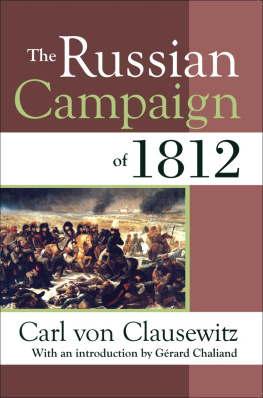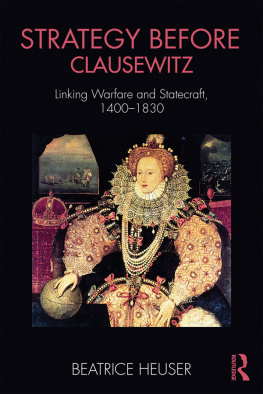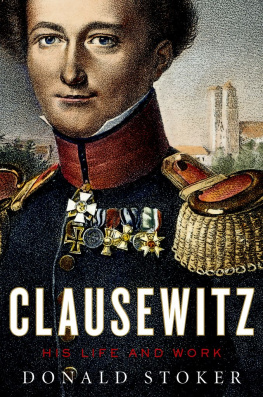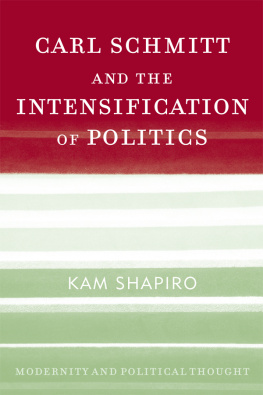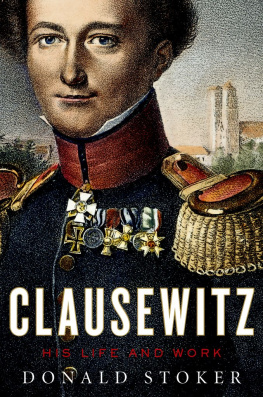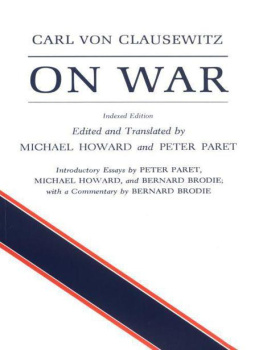
ON WAR
C ARL VON C LAUSEWITZ was born in 1780. A Prussian soldier and writer, he served in the Rhine campaign from 1793 to 1794, and in 1801 he joined the Berlin Academy; there he studied Kant and attracted the attention of Scharnhorst, whom he later helped to reform the Prussian army. He was captured during the Jena campaign, and while serving the Russians he played a prominent part in the Moscow campaigns of 1812 and 1813. On rejoining the Prussian service he became chief of staff of Thielmanns corps at Ligny. From 1818 to 1830 he was director of the Military Academy at Berlin. He was more a philosopher than a soldier, and his fame rests on On War (Vom Kriege), which was published posthumously by his wife in 1832; he had died in 1831.
A NATOL R APOPORT was born in Russia in 1911 and went to the United States in 1922, where he attended public schools in Chicago. He studied music in Chicago and later in Vienna, where he graduated from the State Academy of Music with degrees in composition, piano and conducting. He received his Ph.D. in mathematics from the University of Chicago in 1941. During the Second World War he served in the United States Air Force on overseas duty in Alaska and India. Thereafter he was a member of the Committee on Mathematical Biology of the University of Chicago (194754), a Fellow at the Center for Advanced Studies in the Behavioral Sciences, and joined the faculty of the University of Michigan in 1955. In 1970 Professor Rapoport joined the University of Toronto. He was director of the Institute for Advanced Studies in Vienna (198084), then he returned to the University of Toronto where he is now Professor of Peace and Conflict Studies. His major research is in mathematical biology and mathematical psychology, and he is the author of numerous books on these subjects. His published works include Science and the Goals of Man (1950), Fights, Games and Debates (1960), Prisoners Dilemma: A Study in Conflict and Cooperation (1965), Conflict in Man-Made Environment (Penguin 1974), On War: General System Theory (1986), The Origins of Violence (1989) and Peace, An Idea Whose Time Has Come (1992). He has also contributed to a number of scientific, professional and news journals in the United States and abroad.
CARL VON CLAUSEWITZ

ON WAR
EDITED WITH AN INTRODUCTION BY ANATOL RAPOPORT
PENGUIN BOOKS
PENGUIN BOOKS
Published by the Penguin Group
Penguin Books Ltd, 80 Strand, London WC2R 0RL, England
Penguin Putnam Inc., 375 Hudson Street, New York, New York 10014, USA
Penguin Books Australia Ltd, 250 Camberwell Road, Camberwell, Victoria 3124, Australia
Penguin Books Canada Ltd, 10 Alcorn Avenue, Toronto, Ontario, Canada M4V 3B2
Penguin Books India (P) Ltd, 11 Community Centre, Panchsheel Park, New Delhi 110 017, India
Penguin Books (NZ) Ltd, Cnr Rosedale and Airborne Roads, Albany, Auckland, New Zealand
Penguin Books (South Africa) (Pty) Ltd, 24 Sturdee Avenue, Rosebank 2196, South Africa
Penguin Books Ltd, Registered Offices: 80 Strand, London WC2R 0RL, England
www.penguin.com
Vom Kriege published 1832
This translation published by Routledge & Kegan Paul Ltd 1908
Published in Pelican Classics 1968
Reissued in Penguin Classics 1982
Introduction and notes copyright Penguin Books Ltd, 1968
All rights reserved
Except in the United States of America, this book is sold subject to the condition that it shall not, by way of trade or otherwise, be lent, re-sold, hired out, or otherwise circulated without the publishers prior consent in any form of binding or cover other than that in which it is published and without a similar condition including this condition being imposed on the subsequent purchaser
9780141920283
CONTENTS
BOOK ONE
ON THE NATURE OF WAR
BOOK TWO
ON THE THEORY OF WAR
BOOK THREE
OF STRATEGY IN GENERAL
BOOK FOUR
THE COMBAT
SKETCHES FOR BOOK EIGHT
PLAN OF WAR
PREFACE TO THE PELICAN EDITION
T HE present abridged version of Clausewitzs magnum opus follows the text of the New and Revised Edition (edited by Col. F. N. Maude) of Col. J. J. Grahams translation. This edition first appeared in 1908 and has been reprinted several times, most recently in 1966 (New York: Barnes & Noble; London, Rout-ledge & Kegan Paul.)
Of the original three volumes, the present version includes all of Volume I (except for the last short chapter on night fighting) and six of the nine chapters of Book Eight of Volume III (The Plan of War). The selections were guided by an intention to offer to the contemporary general reader and to the student of international relations those portions of On War which relate most directly to our own time. Clausewitz was concerned both with the role of war in human affairs and with the conduct of military operations. His thoughts on the former subject are a lasting contribution to the treasury of ideas and a source of insight into the terrible problems now confronting humanity. His exposition of technical matters is of interest mostly to the military scholar. For this reason the sections dealing with the philosophical, social, psychological, and political aspects of war have been largely retained, and those dealing with strategic and tactical matters (to which Volume II is almost totally devoted) have been largely omitted. By way of exception, Chapter XXVI of Book Five in Volume II (Arming the Nation), though omitted, deals with the important idea of the Peoples War, developed in the context of defence, and Books Three and Four of Volume I (retained here) deal with strategy and tactics. The omission of the above-mentioned chapter is partly compensated by the fact that similar ideas are developed in the material included; the inclusion of Books Three and Four was for the purpose of illustrating how Clausewitz throughout the work intersperses militarytechnical considerations with political ones, faithful to his main thesis which asserts that politics and war form an indivisible whole.
The reader interested in the historical framework of Clausewitzs ideas is referred to the Sixteenth German Edition, based on the original text and richly annotated by Werner Hahlweg (Bonn: Fred. Dmmlers Verlag, 1952). The reader interested in the works of Clausewitz and about Clausewitz is referred to the bibliographical survey of Peter Paret (World Politics, Vol. 17, January 1965).
The foreword and the annotations of the present volume reflect the editors emphasis on the relevance of Clausewitzs thought and influence to present-day international affairs. However, the notes of Col. Maude have been for the most part retained. Written on the eve of the First World War, these notes present an interesting historical perspective.
Clausewitzs notes are so designated. Col. Maudes notes are followed by his initials. Notes followed by initials A.R. or no initials are the editors.
I am indebted to Professors Karl W. Deutsch and J. David Singer for many helpful comments, criticisms, and suggestions; to Mrs Claire Adler for valuable editorial help, and to Miss Dorothy Williams for the preparation of the manuscript.
I am grateful to Penguin Books for encouraging me to undertake this task.
Next page

